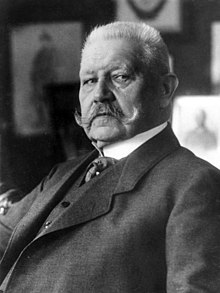Paul Hindenburg
|
Field Marshal Paul von Hindenburg |
|
|---|---|
 |
|
| President of the German Reich | |
|
In office 12 May 1925 – 2 August 1934 |
|
| Chancellor | |
| Preceded by | Friedrich Ebert |
| Succeeded by |
Adolf Hitler (as Führer) |
| Chief of the German General Staff | |
|
In office 29 August 1916 – 3 July 1919 |
|
| Monarch | Wilhelm II |
| President | Friedrich Ebert |
| Preceded by | Erich von Falkenhayn |
| Succeeded by | Wilhelm Groener |
| Personal details | |
| Born |
Paul Ludwig Hans Anton von Beneckendorff und von Hindenburg 2 October 1847 Posen, Duchy of Posen, Prussia, German Confederation (now Poznań, Poland) |
| Died | 2 August 1934 (aged 86) Neudeck, East Prussia, Nazi Germany (now Ogrodzieniec, Poland) |
| Political party | Independent |
| Spouse(s) | Gertrud von Hindenburg |
| Children |
|
| Awards | Pour le Mérite |
| Signature | |
| Military service | |
| Allegiance | |
| Service/branch |
|
| Years of service |
|
| Rank |
|
| Battles/wars | |
Paul Ludwig Hans Anton von Beneckendorff und von Hindenburg (![]() listen ), known generally as Paul von Hindenburg (German: [ˈpaʊl fɔn ˈhɪndn̩bʊʁk] (
listen ), known generally as Paul von Hindenburg (German: [ˈpaʊl fɔn ˈhɪndn̩bʊʁk] (![]() listen); 2 October 1847 – 2 August 1934) was a Generalfeldmarschall and statesman who commanded the German military during the second half of World War I before later being elected President of the German Reich in 1925. He played the key role in the Nazi "Seizure of Power" in January 1933 when, under pressure, he appointed Adolf Hitler chancellor of a "Government of National Concentration", even though the Nazis were a minority in cabinet.
listen); 2 October 1847 – 2 August 1934) was a Generalfeldmarschall and statesman who commanded the German military during the second half of World War I before later being elected President of the German Reich in 1925. He played the key role in the Nazi "Seizure of Power" in January 1933 when, under pressure, he appointed Adolf Hitler chancellor of a "Government of National Concentration", even though the Nazis were a minority in cabinet.
Hindenburg retired from the army for the first time in 1911, but was recalled shortly after the outbreak of World War I in 1914. He first came to national attention at the age of 66 as the victor of the decisive Battle of Tannenberg in August 1914. Upon being named Germany's Chief of the General Staff in August 1916, his popularity among the German public increased exponentially to the point of giving rise to an enormous personality cult. As Kaiser Wilhelm II increasingly delegated his power as Supreme Warlord to the German high command, Hindenburg and his deputy Erich Ludendorff ultimately formed a de facto military dictatorship that dominated German policymaking for the rest of the war.
...
Wikipedia
